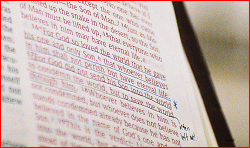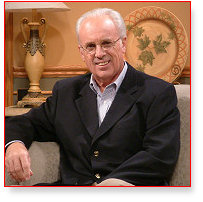by Dan PhillipsThe relationship of the holy, infinite-personal God of Scripture to evil is a theological conundrum, but it's far from merely theoretical. We confront it daily. Evil's thriving presence makes itself felt with every glance at the news media, with every surf of the internet, with every human encounter, and, most dishearteningly, in every succession of thoughts and desires in our own souls. We see its baleful fruit in physical evil such as cancer; we see it more devastatingly in moral evil such as the Cross.
Man has always tried to solve the problem of evil, and he's always failed. He's tried denying the existence of God; but with that denial, he loses his right to call anything "evil." He's tried denying the sovereignty of God; but with that denial, he loses his right to call the God he has created "God." (See further
God and Evil: A Brief Theodicy.)
You might truthfully say that evil is a problem precisely because God is who He is. If He were not good, or if He were not sovereign, evil would be no surprise -- but, in that case, neither would God be God, by any Biblical explication of the term. But God is good, and He is sovereign, and evil is a reality.
One of the most suggestive and meaning-laden texts about the relationship of God to evil is
Genesis 50:20. It unveils realities about this area that we'd not otherwise know, and is worth careful unpacking.

We all know the background. Joseph had revelatory reason to believe he'd have ascendancy over his brothers. Possibly boastfully, certainly unwisely, he shared his dreams with his family. That, with his tattletale ways and his daddy's-favorite zoot suit, combined to make him the object of his brothers' hatred. They meant to kill him, then changed their minds and merely sold him into slavery in Egypt, concocting a cock-and-bull story that broke their father's heart and (they hoped) rid their family of Joseph forever.
Evil acts? Beyond a doubt: evil in intent, feeling, design, and execution. Not a shred of charity or holy intent in what they did.
And we also know that, while progressively bad things happened to Joseph (enslaved, entrapped, imprisoned, forgotten), God nevertheless exalted him from the very depths to the very heights. Through Joseph God preserved the nation of Israel, thus saving the human line of the Messiah, thus making possible the salvation of the world.
And here is what Scripture says about that whole complex of events, plot-twists, conspiracies, surprises, and happenstances: "As for you, you meant evil against me, but God meant it for good, to bring it about that many people should be kept alive, as they are today." This relatively brief assertion fairly bursts with meaning. Let's come a little closer and examine the details.
The Hebrew text. The ESV "As for you" indicates what the NIV (natch) misses, that the Hebrew has an emphatic pronoun; thus "
You, you intended." Joseph stresses his brothers' personal involvement, their ownership of this evil intent.
But what is interesting is the fact that the next clause is an asyndeton, which is to say there is no conjunction. Though the ESV supplies "but," there is no such word in Hebrew. The two facts are simply laid out side-by-side: "And you, you planned evil against me. God planned it for good...."
Also significant is the repetition of forms of the same verb,
chashab, meaning to think, plan, devise. Both actors shared the same activity, but with different intent, and to a different end. The brothers
planned, God
planned.
One complex event. Note that Joseph does not split the recent events of his

life into many events, and say that the brothers meant something for their parts, while God meant something for His. Rather, he encompasses and speaks of the many disparate events as one: "God meant
it," the event, viewed as a single complex whole. The same event.
Two wills. In this same, single event, two intentions confluesced.
One was
the brothers' intention, and make no mistake: their intention was evil. The goodness of God's intent does not make their intent moral, nor does the sovereignty of His intent make theirs insignificant nor robotic. Their intent is spoken of as
their intent, and emphatically so, as noted above. Though good resulted,
they did not intend good to result. They intended evil, and only evil.
But the other intent was
God's intent, and His intent was wholly good. Notice that this intent takes in
the same complex of events, the unambiguously evil actions of the brothers: "God intended
it." In, above, through, and overriding the evil intention and action of the brothers was the good intention of God.
It would be saying too much to say that God Himself
did those actions, but it would be saying too little to say merely that He
used those actions -- as if they were so many Lego's He merely found lying on the floor, and tried to make something of them. He
meant those actions, those evil actions, for good.
One act, two intentions. Which intention overruled? Which intention was ultimate?
The question is not too difficult to answer, if one is concerned with preserving the teaching of Scripture rather than a particular doctrinal scheme. Some will try to find a way to evade the Biblical doctrine of God's sovereignty even here, though. I can imagine one trying to find refuge by saying, "Ah, yes, there it is: man's free will, and God's sovereign will, both independent of each other!"
It may be a popular dodge, but it certainly is not the teaching of the text. If that were the case, then Joseph's situation could never have resolved. The evil intent of the brothers and the good intent of God would battle as equals, as yin and yang, bringing a chaotic and unsettled conclusion -- or none at all.
Is this what Joseph is saying? Clearly not. Clearly Joseph is saying that the whole mess has ended well, it has ended as "good." So whose will overruled evil for good? Whose will triumphed? From this text alone, we must say that it was
Yahweh's will that triumphed. Then of course, when we bring in other Scripture, this answer is confirmed a hundredfold (Psalm 115:3; Proverbs 16:1, 4, 9; 19:21, etc.).
This is how we must understand evil committed by personal agents. The evil intent, the activity, is truly and genuinely that of the agents themselves. Yet behind that intent, and over it, and overruling it, is the good and holy plan and will of God. This has a very meaningful personal application, which I develop at length pastorally in a sermon titled
God and Our Tragedies, delivered 9/11/05.

But it also has application to the discussion that arose over at Adrian's blog, about
whether God killed Jesus. We set ourselves up for a false dichotomy if we demand an answer to the question as to whether God killed Jesus,
or man killed Jesus. If we choose the latter to the exclusion of the former, we have to waffle and wiggle with texts like
Isaiah 53:10. If we attempt the reverse, we will not be dealing honestly with verses such as
Acts 2:23 and
5:30.
Of course men did all they could do to kill Jesus. All the betrayers and the persecutors and the lynch mob stand guilty and wholly responsible for their loathesome acts.
But in the final analysis,
"For this reason the Father loves me, because I lay down my life that I may take it up again. 18 No one takes it from me, but I lay it down of my own accord. I have authority to lay it down, and I have authority to take it up again. This charge I have received from my Father." (John 10:17-18)
...and "the LORD was pleased To crush Him, putting Him to grief" (
Isaiah 53:10). That verse is crucial in Isaiah, as we see better when we tie it back in with
Isaiah 1:11 -- "What to me is the multitude of your sacrifices? says the LORD; I have had enough of burnt offerings of rams and the fat of well-fed beasts;
I do not delight in the blood of bulls, or of lambs, or of goats." We Gentile Christians don't feel the awesome impact of this statement. It is really a crushing, devastating accouncement: if God does not
delight in the blood of bulls, lambs, or goats, they're utterly sunk!
That's all they had, to deal with their sin... and now God was saying that He did not
delight in those sacrifices. That left them
nothing!
Ah, but then in
Isaiah 53:10, we learn what Yahweh
will delight in, for it uses
the same Hebrew verb root (
ch-ph-ts), in saying that Yahweh "was pleased" to crush His Servant. You could just as well translated that He "was delighted" to crush Him. The good pleasure of the Lord, in achieving the redemption of His people in a way both just and graceious, was accomplished when Yahweh Himself crushed His dear Son.
Man meant it for evil; but God meant it for good, for salvation, for redemption. And His will always prevails.
After all, He is
God.




 Declaration of Independence, July 4, 1776, in which the 13 colonies declared themselves independent of Great Britain, and which ended with the words “for the support of this declaration…we mutually pledge to each other our lives, our fortunes and our sacred honor.”
Declaration of Independence, July 4, 1776, in which the 13 colonies declared themselves independent of Great Britain, and which ended with the words “for the support of this declaration…we mutually pledge to each other our lives, our fortunes and our sacred honor.”
 made it possible for us to loose ourselves from our sins by His blood. Nor does He say that Christ made loosing from our sins available by his blood. Rather, Jesus Christ actually loosed us from our sins by His blood!
made it possible for us to loose ourselves from our sins by His blood. Nor does He say that Christ made loosing from our sins available by his blood. Rather, Jesus Christ actually loosed us from our sins by His blood!
 Today I'm answering an e-mail I received after making some comments about God's sovereignty and the origin of evil. I subsequently heard from a gung-ho ultra-high Calvinist who suggested that if God is truly Sovereign, He must be both the author and efficient cause of evil as well. Indeed, he insisted, citing the KJV rendition of Isaiah 45:7, "God created evil."
Today I'm answering an e-mail I received after making some comments about God's sovereignty and the origin of evil. I subsequently heard from a gung-ho ultra-high Calvinist who suggested that if God is truly Sovereign, He must be both the author and efficient cause of evil as well. Indeed, he insisted, citing the KJV rendition of Isaiah 45:7, "God created evil."
 term chazon used in this way. It just isn't. But you will find a consistent use of the term to indicate prophetic revelation, such as we have today in Scripture alone (cf. Isaiah 1:1; Daniel 8:1, 15; Hosea 12:11; Obadiah 1; Nahum 1:1, etc.).
term chazon used in this way. It just isn't. But you will find a consistent use of the term to indicate prophetic revelation, such as we have today in Scripture alone (cf. Isaiah 1:1; Daniel 8:1, 15; Hosea 12:11; Obadiah 1; Nahum 1:1, etc.). anvil of far too much experience. My beloved wife is very goal-oriented, and she's superb at setting terrific goals. I remember a day she engineered at Disneyland with our (then) two children, and it was like the most precise ballet, starting at 8am and ending at 2am. What we packed into those hours makes for a breath-taking memory. Well over a decade later, I still marvel.
anvil of far too much experience. My beloved wife is very goal-oriented, and she's superb at setting terrific goals. I remember a day she engineered at Disneyland with our (then) two children, and it was like the most precise ballet, starting at 8am and ending at 2am. What we packed into those hours makes for a breath-taking memory. Well over a decade later, I still marvel. Brad, from
Brad, from  I blogged today at my home blog about John 5 and the particular nature of Christ’s earthly work in that passage, but that topic always gets me stirred up about the nature of the work of Christ.
I blogged today at my home blog about John 5 and the particular nature of Christ’s earthly work in that passage, but that topic always gets me stirred up about the nature of the work of Christ. It is a proclamation of fact, not a question to be debated. I cannot trick you into hearing it, either – because a savior is not a trickster or a con-man who makes you think you’re getting cotton candy when in fact you are getting your teeth drilled even if you need your teeth drilled.
It is a proclamation of fact, not a question to be debated. I cannot trick you into hearing it, either – because a savior is not a trickster or a con-man who makes you think you’re getting cotton candy when in fact you are getting your teeth drilled even if you need your teeth drilled.
 literally has
literally has  him are all in the singular: 2:4, 8, 16, 18) was the same then as it is today: he was a charismatic individual who came in with special, personal, private revelation, special truths, special methods, all of which were
him are all in the singular: 2:4, 8, 16, 18) was the same then as it is today: he was a charismatic individual who came in with special, personal, private revelation, special truths, special methods, all of which were  responsibility. We have no more holy trump cards hidden up our sleeves that no one else can see. We can't pull out our cherished "the Lord told me" cards, or our "I just feel led to" cards, and end the debate. All we have is that Bible out there, that everyone else can see, study, learn, and meditate over just as surely as we. We have to agree with the Holy Spirit that it is what He said it was: sufficient (Deuteronomy 29:29; Psalm 119; 2 Timothy 3:15-17, etc. ad inf.), and we study it to know His mind (2 Timothy 2:7). We're on a level playing field; we have no mystical "gotcha" from God.
responsibility. We have no more holy trump cards hidden up our sleeves that no one else can see. We can't pull out our cherished "the Lord told me" cards, or our "I just feel led to" cards, and end the debate. All we have is that Bible out there, that everyone else can see, study, learn, and meditate over just as surely as we. We have to agree with the Holy Spirit that it is what He said it was: sufficient (Deuteronomy 29:29; Psalm 119; 2 Timothy 3:15-17, etc. ad inf.), and we study it to know His mind (2 Timothy 2:7). We're on a level playing field; we have no mystical "gotcha" from God. Your weekly dose of Spurgeon
Your weekly dose of Spurgeon

 I was having a discussion with my pastor, and I related it to my wife (who is the greatest blogger who never typed 1K of bandwidth). The discussion was about church leadership, and whether the metaphor of the shepherd was useful in a society like America where 95% of the people have never seen one sheep, let alone a flock, let alone a person who was herding sheep.
I was having a discussion with my pastor, and I related it to my wife (who is the greatest blogger who never typed 1K of bandwidth). The discussion was about church leadership, and whether the metaphor of the shepherd was useful in a society like America where 95% of the people have never seen one sheep, let alone a flock, let alone a person who was herding sheep.
 The biggest separation, however, between the good shepherd metaphor and the CEO is that the Shepherd lives with his sheep in every way. That is, the shepherd has to get dirty and do distasteful and even degrading things to make sure he takes proper care of his sheep. I don’t know a lot of CEOs who are ready to degrade themselves, for example, by working in the same conditions as the hourly single parent who has to work on the line. “But cent,” you might say, “the CEO does a pretty radically different kind of work than the hourly employee,” and I’d agree with you. Christ does a pretty radically different work than I do, but you know something: though he was in the form of God, did not count equality with God a thing to be grasped, but made himself nothing, taking the form of a servant, being born in the likeness of men. And being found in human form, he humbled himself by becoming obedient to the point of death, even death on a cross.
The biggest separation, however, between the good shepherd metaphor and the CEO is that the Shepherd lives with his sheep in every way. That is, the shepherd has to get dirty and do distasteful and even degrading things to make sure he takes proper care of his sheep. I don’t know a lot of CEOs who are ready to degrade themselves, for example, by working in the same conditions as the hourly single parent who has to work on the line. “But cent,” you might say, “the CEO does a pretty radically different kind of work than the hourly employee,” and I’d agree with you. Christ does a pretty radically different work than I do, but you know something: though he was in the form of God, did not count equality with God a thing to be grasped, but made himself nothing, taking the form of a servant, being born in the likeness of men. And being found in human form, he humbled himself by becoming obedient to the point of death, even death on a cross. It's funny/sad how some false notions are like movie monsters.
It's funny/sad how some false notions are like movie monsters. I for my part shall cease to be interested in the subject at all. The only God about whom I can feel concerned is one who has objective existence, an existence independent of man.
I for my part shall cease to be interested in the subject at all. The only God about whom I can feel concerned is one who has objective existence, an existence independent of man. 
 I'm back from my weekend trip. We got back early Monday, but I have been too busy to read the blog, much less make a post explaining where I was over the weekend. Sorry to have been so mysterious.
I'm back from my weekend trip. We got back early Monday, but I have been too busy to read the blog, much less make a post explaining where I was over the weekend. Sorry to have been so mysterious.



 Our friend Kevin D. Hendricks at
Our friend Kevin D. Hendricks at  We all know the background. Joseph had revelatory reason to believe he'd have ascendancy over his brothers. Possibly boastfully, certainly unwisely, he shared his dreams with his family. That, with his tattletale ways and his daddy's-favorite zoot suit, combined to make him the object of his brothers' hatred. They meant to kill him, then changed their minds and merely sold him into slavery in Egypt, concocting a cock-and-bull story that broke their father's heart and (they hoped) rid their family of Joseph forever.
We all know the background. Joseph had revelatory reason to believe he'd have ascendancy over his brothers. Possibly boastfully, certainly unwisely, he shared his dreams with his family. That, with his tattletale ways and his daddy's-favorite zoot suit, combined to make him the object of his brothers' hatred. They meant to kill him, then changed their minds and merely sold him into slavery in Egypt, concocting a cock-and-bull story that broke their father's heart and (they hoped) rid their family of Joseph forever. life into many events, and say that the brothers meant something for their parts, while God meant something for His. Rather, he encompasses and speaks of the many disparate events as one: "God meant it," the event, viewed as a single complex whole. The same event.
life into many events, and say that the brothers meant something for their parts, while God meant something for His. Rather, he encompasses and speaks of the many disparate events as one: "God meant it," the event, viewed as a single complex whole. The same event. But it also has application to the discussion that arose over at Adrian's blog, about
But it also has application to the discussion that arose over at Adrian's blog, about  The murder of Jesus was a vast conspiracy involving Rome, Herod, the Gentiles, the Jewish Sanhedrin, and the people of Israel—diverse groups who were seldom fully in accord with one another. In fact, it is significant that the crucifixion of Christ is the only historical event where all those factions worked together to achieve a common goal. All were culpable. All bear the guilt together. The Jews as a race were no more or less blameworthy than the Gentiles.
The murder of Jesus was a vast conspiracy involving Rome, Herod, the Gentiles, the Jewish Sanhedrin, and the people of Israel—diverse groups who were seldom fully in accord with one another. In fact, it is significant that the crucifixion of Christ is the only historical event where all those factions worked together to achieve a common goal. All were culpable. All bear the guilt together. The Jews as a race were no more or less blameworthy than the Gentiles. The designs of those who killed Christ were entirely murderous. They are by no means exonerated from their evil, just because God's purposes are good. It was still the act of "lawless hands" (Acts 2:23). It was, as far as the human perpetrators were concerned, an act of pure evil. The wickedness of the crucifixion is in no sense mitigated by the fact that God sovereignly ordained it for good. The truth that it was His sovereign plan makes the deed itself no less a diabolical act of murder.
The designs of those who killed Christ were entirely murderous. They are by no means exonerated from their evil, just because God's purposes are good. It was still the act of "lawless hands" (Acts 2:23). It was, as far as the human perpetrators were concerned, an act of pure evil. The wickedness of the crucifixion is in no sense mitigated by the fact that God sovereignly ordained it for good. The truth that it was His sovereign plan makes the deed itself no less a diabolical act of murder. The cross is therefore the ultimate proof of the utter sovereignty of God. His purposes are always fulfilled in spite of the evil intentions of sinners. God even works His righteousness through the evil acts of unrighteous agents. Far from making Him culpable for their evil, this demonstrates how all He does is good, and how He is able to work all things together for good (Romans 8:28)—even the most wicked deed the powers of evil have ever conspired to carry out.
The cross is therefore the ultimate proof of the utter sovereignty of God. His purposes are always fulfilled in spite of the evil intentions of sinners. God even works His righteousness through the evil acts of unrighteous agents. Far from making Him culpable for their evil, this demonstrates how all He does is good, and how He is able to work all things together for good (Romans 8:28)—even the most wicked deed the powers of evil have ever conspired to carry out. So today was my 53rd
So today was my 53rd 









